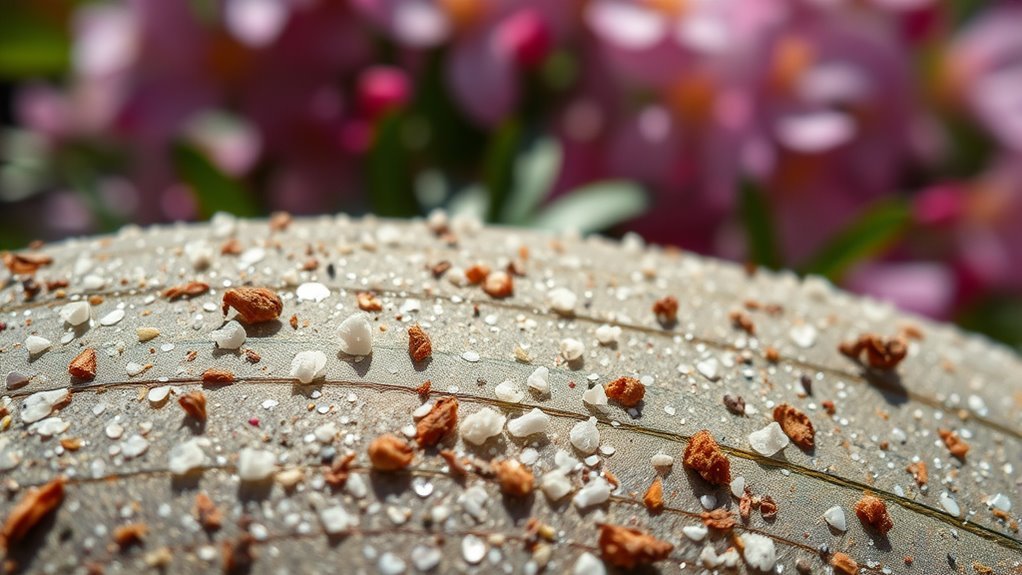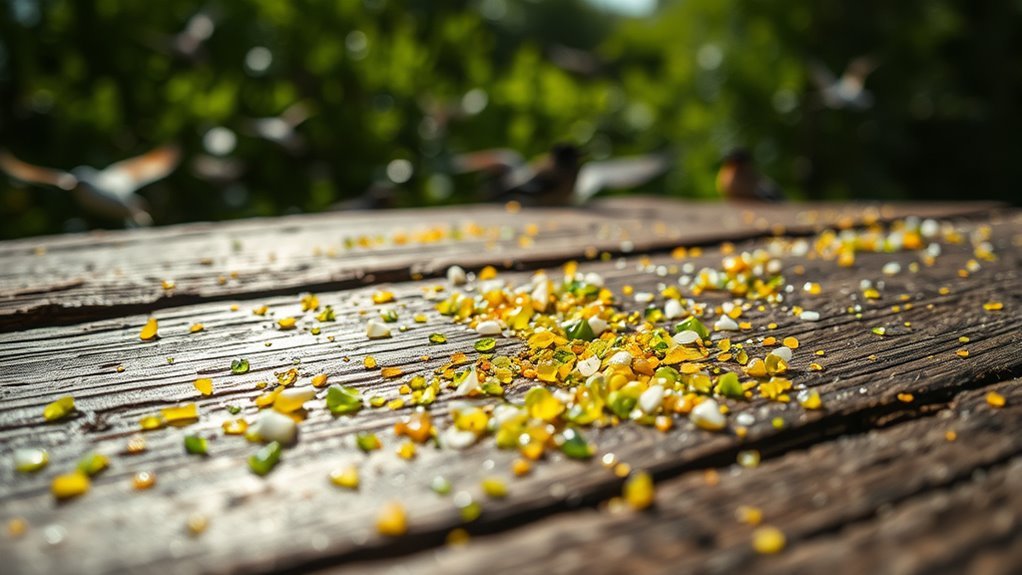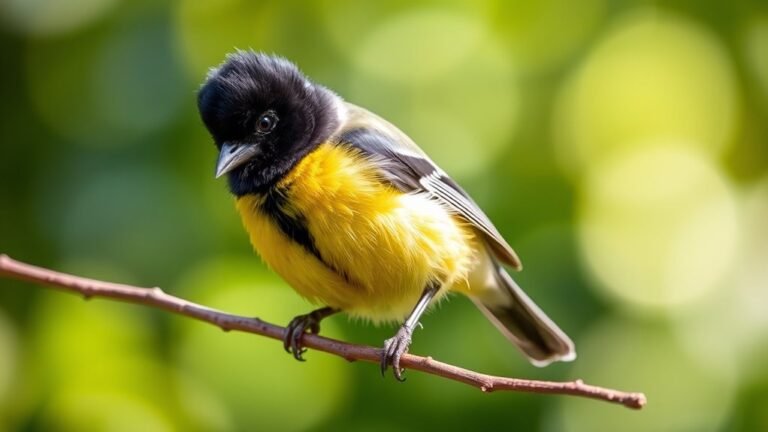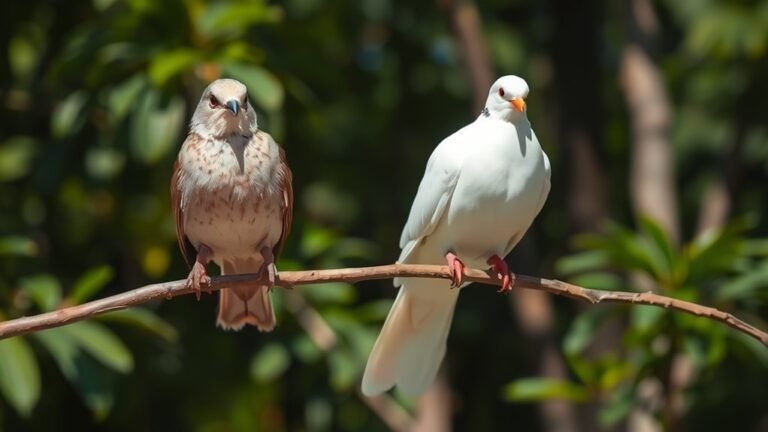The Significance of Bird Droppings on You
When you think about bird droppings, you may only see a mess. However, these droppings hold important benefits. They are rich in nutrients that improve soil fertility and promote plant growth. They also provide insights into the health of your local ecosystem and the variety of bird species nearby. Understanding the connection between bird droppings and nature helps us appreciate the environment. So, how do these droppings affect your everyday surroundings?
Key Takeaways
- Bird droppings enhance soil fertility, promoting plant growth and contributing to a healthier environment for everyone.
- Analyzing droppings allows us to understand local bird diets and related ecosystem dynamics, impacting agricultural practices.
- The presence of diverse bird populations, indicated by droppings, signifies a balanced ecosystem beneficial to human health.
- Bird droppings can pose health risks, such as disease transmission, requiring awareness and precautions in areas with high bird activity.
- Supporting bird populations through conservation efforts helps maintain ecosystem vitality, which ultimately benefits human communities and natural resources.
Understanding the Composition of Bird Droppings

Bird droppings are more than just waste; they tell us about what birds eat and how they fit into their environment. These droppings contain nitrogen, phosphorus, and potassium.
These chemicals are important for plant growth. Analyzing the nutrients in droppings can show us the diets of local birds. For example, birds that eat seeds produce different droppings than those that eat insects.
By looking at droppings, we can learn about bird diets and their effects on the ecosystem. This knowledge helps us appreciate the connections between birds and plants, encouraging us to understand and protect these relationships.
Engaging with this topic enriches our relationship with nature and highlights the balance within our ecosystem.
Indicators of Ecosystem Health
Have you thought about how bird droppings can indicate ecosystem health? These droppings act as important signals of pollution. A variety of bird species thriving in an area shows that the habitat is balanced. This balance is crucial for habitat restoration.
However, a decline in bird populations or unusual droppings may point to environmental stress, such as pollution or habitat loss.
Scientists study the nutrients in bird droppings to measure pollution levels and understand its effects on local plants and animals. Knowing these facts helps you see the ecosystem's health and your role in protecting it for future generations.
Bird Populations and Species Diversity

Bird populations and species diversity are important for understanding ecosystem health. When different bird species thrive, it indicates a balanced habitat.
Bird migration shows how species adapt to seasonal changes, affecting plant and insect distribution. However, habitat loss threatens these populations by disrupting migration routes and breeding locations.
Engaging with nature reveals how each bird species plays a role in the ecosystem; their decline can signal broader environmental problems. Supporting biodiversity helps maintain healthy ecosystems and fosters community connections.
Encouraging local conservation efforts builds appreciation for the natural world.
Nutrient Cycle and Soil Enrichment
Bird droppings provide important nutrients that enrich soil. They contain nitrogen, phosphorus, and potassium, which plants need to grow.
When birds excrete waste, it helps recycle these nutrients and improves soil fertility. As droppings break down, they nourish microorganisms. These tiny organisms help decompose organic matter, supporting healthy ecosystems.
Understanding the role of bird droppings highlights how they help maintain balance in nature. Birds play a vital role in sustaining biodiversity and promoting strong plant life.
Recognizing this connection enriches our appreciation of local ecosystems.
The Impact on Agriculture and Gardening

Bird droppings are a valuable natural fertilizer for agriculture and gardening. They enrich the soil, which leads to healthier crops and vibrant gardens. By using bird droppings, you can boost plant growth while reducing the need for synthetic fertilizers. This practice supports sustainable gardening.
Bird droppings can also help with pest control. They attract insect-eating birds, which can lower pest populations. This reduces the use of chemical pesticides and promotes a healthier ecosystem in your garden or farm. Using bird droppings fosters a lively environment and encourages biodiversity.
The Role of Bird Droppings in Disease Transmission
Bird droppings can spread diseases in both urban and rural areas. They can carry germs like salmonella and histoplasmosis.
When birds gather in large groups, their waste piles up, creating a habitat for harmful bacteria and fungi. This contamination can affect your health.
Health officials warn about outbreaks linked to bird droppings, especially in crowded places. By understanding this risk, you can take steps to protect yourself.
Avoid touching droppings and help keep public spaces clean. These actions can help stop the spread of disease in your community.
Conservation Efforts and Bird Monitoring
Bird populations face many threats from habitat loss and climate change. Effective conservation efforts and bird monitoring are crucial for their survival.
You can help by using birdwatching guides that provide information about local species and their needs. These guides improve your field experience and encourage community involvement in conservation projects.
Advocating for habitat preservation helps protect the ecosystems that birds rely on. Monitoring programs, set up by conservation organizations, allow you to report bird sightings and trends. This information helps researchers track changes in bird populations.
Your participation strengthens connections within the nature-loving community and ensures future generations can enjoy the beauty of birds.
Uncovering Dietary Habits of Birds
Birds play an important role in the ecosystem. Their dietary habits provide insights into their behavior and the environments they live in. Different bird species have specific food preferences. Some eat seeds, others insects, and some prefer fruits.
How birds choose their food can indicate the health of their habitat and the availability of food. For example, when bird populations decline, it often means that food sources are limited. This can disrupt the balance in ecosystems.
Observing birds' eating habits can help you understand not only the birds near you but also the overall health of the ecosystem. This awareness deepens your connection to nature and highlights the importance of supporting our environment.
Frequently Asked Questions
Can Bird Droppings Damage My Car's Paint?
Yes, bird droppings can harm your car's paint if you do not clean them quickly. The droppings contain acids that can damage the surface. Regular car care, such as using paint protection, can help defend against this damage. It is important to wash your car promptly after finding droppings to keep its paint in good condition.
How Can I Safely Clean Bird Droppings?
To clean bird droppings safely, follow these steps:
- Wear Protection: Always put on gloves and goggles to protect your skin and eyes.
- Gather Supplies: Use a microfiber cloth and soapy water for cleaning.
- Clean the Area: Gently wipe the droppings with the damp cloth. Make sure to wet the droppings first if they are dry to avoid dust.
- Rinse: After cleaning, rinse the area thoroughly with clean water.
- Avoid Harsh Chemicals: Do not use strong cleaners. They can damage your vehicle's paint or finish.
Following these steps will help you clean bird droppings effectively while keeping your vehicle safe.
Are Certain Bird Droppings More Harmful Than Others?
Certain bird droppings can be more harmful than others. Pigeon and starling waste often contain harmful bacteria and toxic fungi. These can lead to serious health risks, especially if inhaled or if they touch broken skin. It is important to handle these droppings with care to avoid health issues.
Do Bird Droppings Attract Pests or Insects?
Bird droppings can attract pests, which may lead to insect infestations. The organic material in the droppings serves as food for various insects. Therefore, it is important to keep an eye on bird droppings around your home or garden. Regularly cleaning these droppings can help prevent pest problems.
What Should I Do if I Get Bird Droppings on Me?
If bird droppings get on you, act fast. First, put on gloves. Then, wash the area with soap and water to reduce health risks. After that, use a disinfectant to clean the spot. Follow these steps for effective cleaning and peace of mind.

Hello, I’m Emily Price, the founder of Birds Affection. As a passionate bird enthusiast and spiritual seeker, I’ve always been fascinated by the symbolic meanings and mystical connections between birds and our lives. On this website, I share my knowledge and insights on the spiritual significance of various bird species, exploring their roles as messengers, guides, and teachers. Through my writing, I aim to inspire and educate others on the profound wisdom and beauty that birds bring to our world. Join me on this journey as we delve into the enchanting realm of bird symbolism and discover the hidden meanings behind these magnificent creatures.







